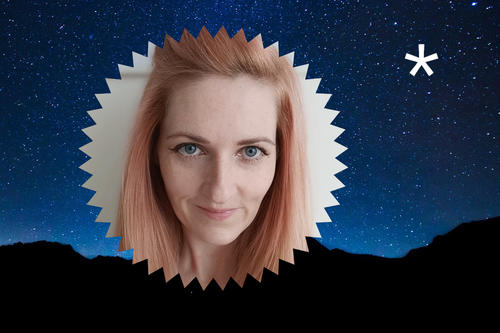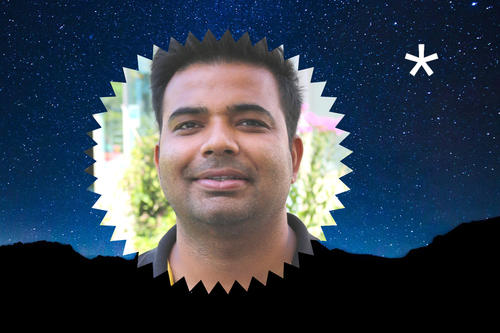May we introduce: Ahamed and Lenka, Rising Star Fellows 2024
Lenka Štenclová
The biologist Lenka Štenclová recently joined the team of Prof. Timo Niedermeyer at the Institute of Pharmacy of Freie Universität Berlin as a postdoctoral research fellow within the program ´Rising Star´ for the year 2024. She obtained her education at the University of South Bohemia in České Budějovice (Czech Republic) in the field of systematics of green algae, where she also completed her doctoral thesis. During her studies, she also collaborated with Institute of Hydrobiology of Czech Academy of Sciences on various projects dealing with systematics, genomics and secondary metabolites of blue-green algae: cyanobacteria.
Her research project at Freie Universität Berlin follows the successful cooperation of the team of Prof. Timo Niedermeyer and the team of Dr. Jan Mareš from Institute of Hydrobiology CAS in the field of cyanobacterial secondary metabolites. She would like to determine novel cyanobacterial producers of dolastatins living in newly established freshwater habitats, post mining lakes of north-west of Bohemia and the responsible biosynthetic gene clusters in the producers’ genomes. Her second aim is to elucidate the actual physiological function of dolastatins for the organism itself, introducing the infamous toxic freshwater cyanobacterium Aetokthonos hydrillicola as a model organism.
At Prof. Niedermeyer´s labs Lenka intends to use a set of analytical chemistry methods, essential for answering the first question. To answer her second research question, she is going to use technologies developed in the Niedermeyer lab to produce “clickable” AEST, followed by proteomics assays executed in collaboration with the Core Facility BioSupraMol. Finding the putative binding protein for AEST can be first modelled and afterwards evaluated in silico via advanced methods such as molecular docking in collaboration with an expert for computer-aided bioactive compound design, Prof. Gerhard Wolber, at the Institute of Pharmacy. Dr. Dennis Nürnberg´s team at the Institute of Physics is coworking with her on the genetic manipulation of A. hydrillicola, which is necessary to bring the project to its completion and examine the suspected effect of dolastatin derivatives on the morphology of its producer in vivo. His group has already experiences with true-branching filamentous cyanobacterium, Fischerella sp., which is enormous advantage for her work with a challenging so far not genetically manipulated non-model organism.
“I especially appreciate all the collaborations with the respectable experts from the various scientific fields at Freie Universität Berlin and the possibility to learn new methods and approaches, together with opportunity to share my knowledge from the biology field with their teams; particularly cultivation techniques and methods of molecular biology in the newly established Prof. Niedermeyer´s lab. I hope for an opened cooperation which is crucial for accomplishing multidisciplinary scientific projects.”Ahamed Khan
The biotechnologist Ahamed Khan came to Freie Universität Berlin as a postdoctoral research fellow in 2024, working under the supervision of Prof. Daniel Schubert at the Institute of Biology of Freie Universität Berlin. He also collaborates with Petra Procházková Schrumpfová at CEITEC National Centre for Biomolecular Research at Brno, Czech Republic.
Within his research project he wants to investigate dynamic Nuclear Bodies associated protein complexes and their influence in regulation of chromatin organization under abiotic stress.
The plant nucleus is a dynamic compartment that plays a crucial role in sensing immediate environmental cues by inducing a series of intranuclear events to optimize gene expression for a rapid response against stress, ensuring the plant's survival in unfavorable climatic conditions. In recent years, NBs have been suggested to play a role in spatiotemporally modulating gene expression in response to environmental stimuli.
However, the mechanisms by which these subnuclear bodies perceive signals from external stimuli and transmit information to chromatin in order to initiate stress responses remain largely unknown. In this context, Ahamed Khan aims to deepen the understanding of the molecular mechanisms involved in the regulation of NBs under elevated temperature conditions. Specifically, his project aims to gather substantial information about the crosstalk between the NBs derived from TRB1-PWO1-BAF60 proteins in order to comprehend their dynamic nature and regulation during heat stress. Additionally, the outcome of the project also provides information on the synergistic modulation of chromatin and associated proteins, enabling precise gene regulation under heat stress conditions.
Ahamed Khan obtained a Bachelor’s degree in Botany at Ramjas College, University of Delhi, India, and a Master’s Degree in Biotechnology at Utkal University, Bhubaneswar, India. He completed his doctoral thesis about “Molecular characterization of novel promoter/s from para-retroviruses and their interaction with stress inducible transcription factors” at Institute of Life Sciences (ILS), DBT, Government of India, India. He also received the MSCA-IF 2020 award to conduct his postdoctoral research on deciphering the evolution and function of plant-specific PWO proteins. He carried out this research with Iva Mozgová's group at the Institute of Plant Molecular Biology (IPMB) in České Budějovice, Czech Republic, in close collaboration with Sara Farrona’s lab at NUI Galway, Ireland.
“This fellowship aligns perfectly with my current research interests and long-term career goals. My primary objective is to deepen my understanding of the functions of coordinated protein complexes in plant nuclei, particularly their roles in chromatin dynamics and gene transcription. This fellowship offers the ideal resources and mentorship to achieve these goals. Working with Prof. Dr. Daniel Schubert, the interdisciplinary laboratory led by Prof. Dr. Helge Ewers, and accessing the cutting-edge facilities at the Department of Biology, Freie Universität Berlin, will significantly enhance my skills and knowledge.I previously visited Freie Universität Berlin for a short-term project at Prof. Dr. Daniel Schubert's lab and was very impressed by the environment and the work being done there. The university has outstanding facilities for advanced science, especially the Suprafab lab for microscopy and other high-tech equipment. Freie Universität Berlin offers a wonderful atmosphere with plenty of green spaces and a vibrant, diverse culture, making it an ideal place for me to start my new journey.
Berlin itself has also made a strong impression on me with its rich cultural diversity. I’ve enjoyed exploring the city’s history and visiting various monuments. I often take my daughter to local parks for football and other activities, thanks to the abundance of such facilities in Berlin. Swimming is a hobby of mine, and I love diving into the nearby lakes on weekends. Additionally, Berlin’s thriving Indian community provides opportunities for social gatherings and cricket matches, which I greatly appreciate.
I see several exciting opportunities as a Rising Star Fellow at Freie Universität Berlin. First, the project aligns perfectly with my existing research questions and delves into more complex quest that are crucial for my work. The chance to collaborate with leading experts at FU will significantly enhance my skills and knowledge. Additionally, FU provides several training sessions and workshops for project management and grants, including the Master Class MSCA-IF, DFG Info Talk, and training in data science and advanced microscopy, which will help me gain new skills to reach my academic goals.
Overall, the combination of advanced instrumental facilities, great mentorship, and a collaborative environment makes FU an ideal place to pursue my research and professional development goals. The major downside is, of course, being away from my family back in India, and most importantly, missing the sun during the long winter months.”

